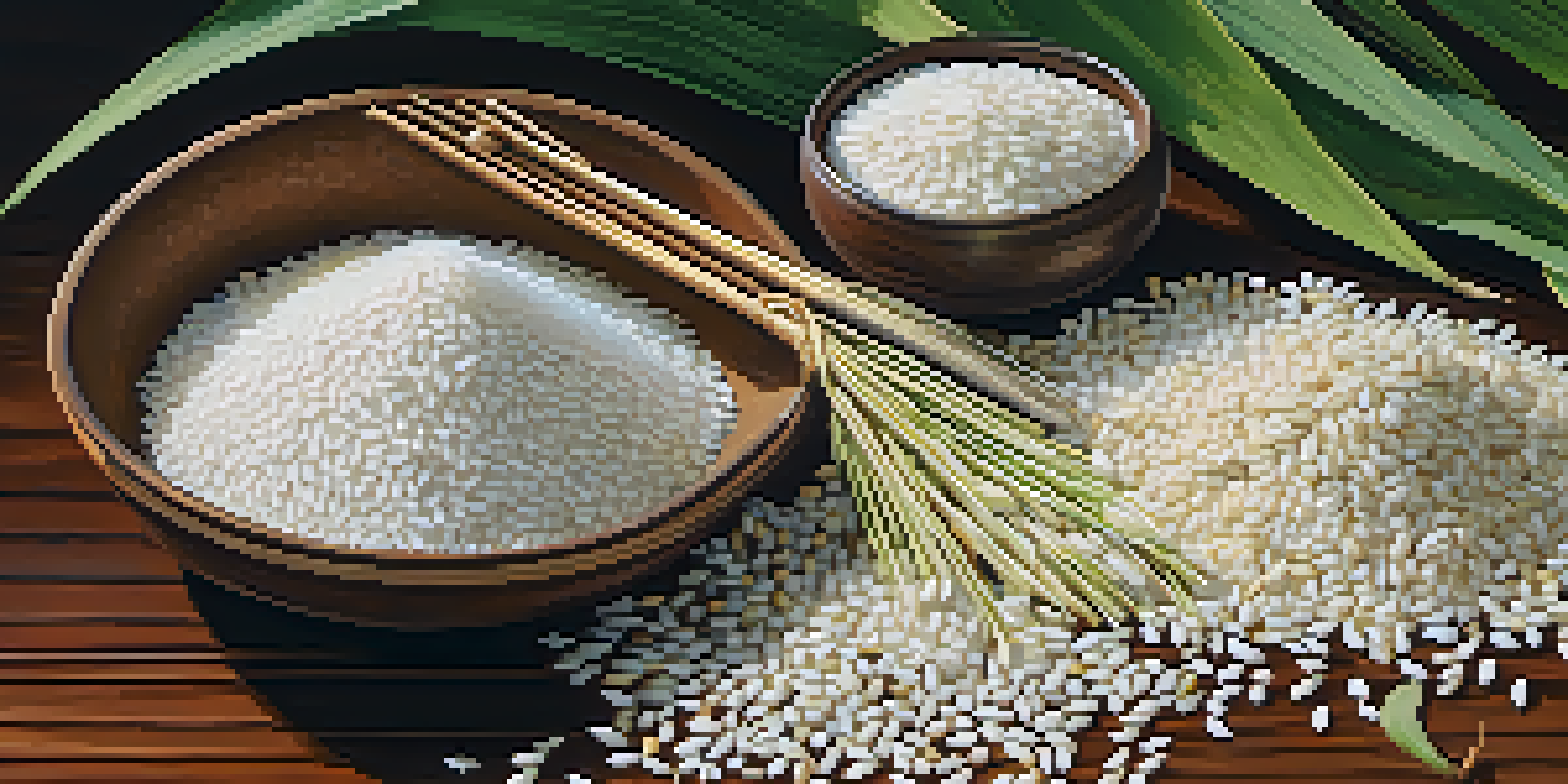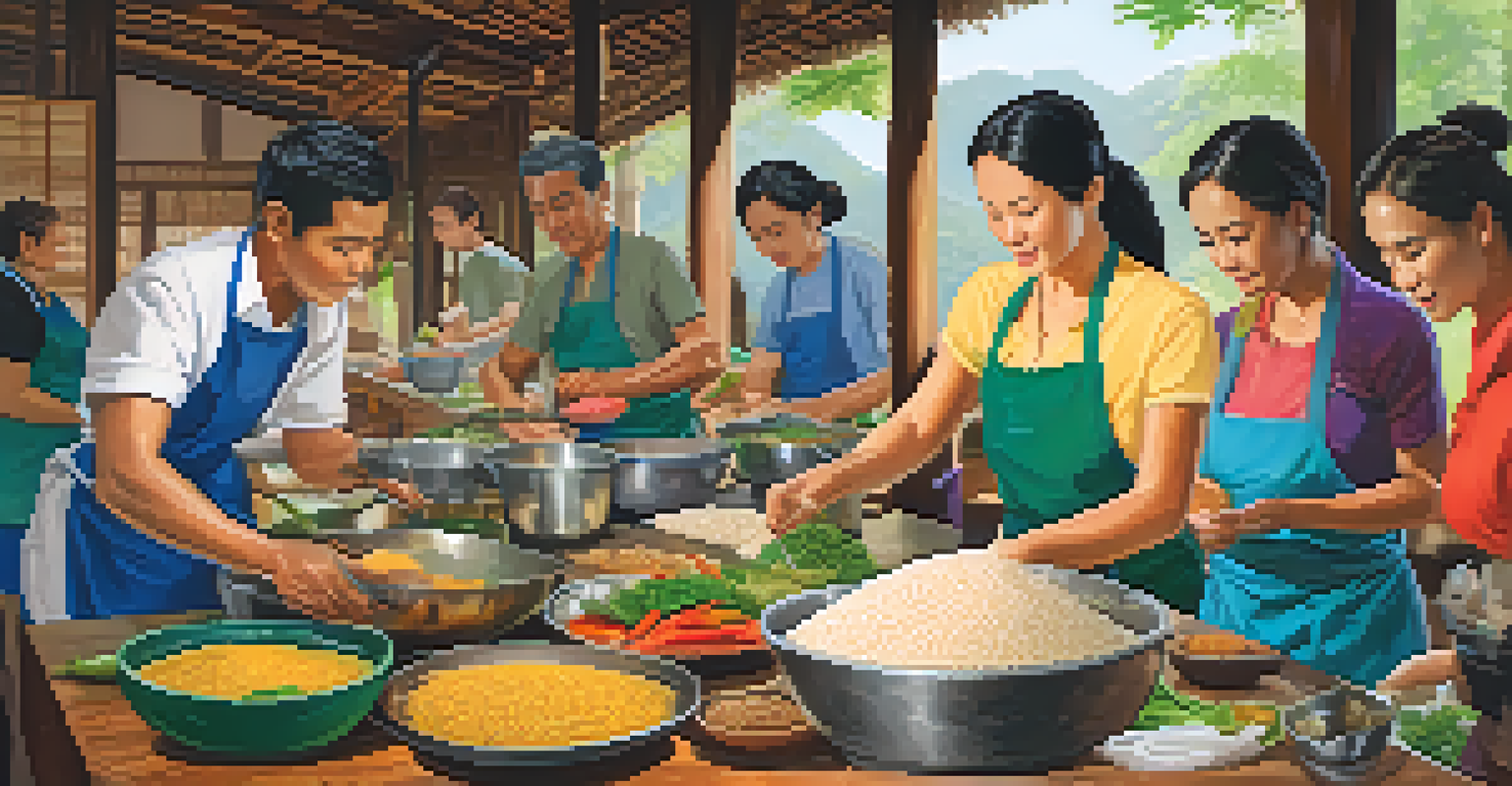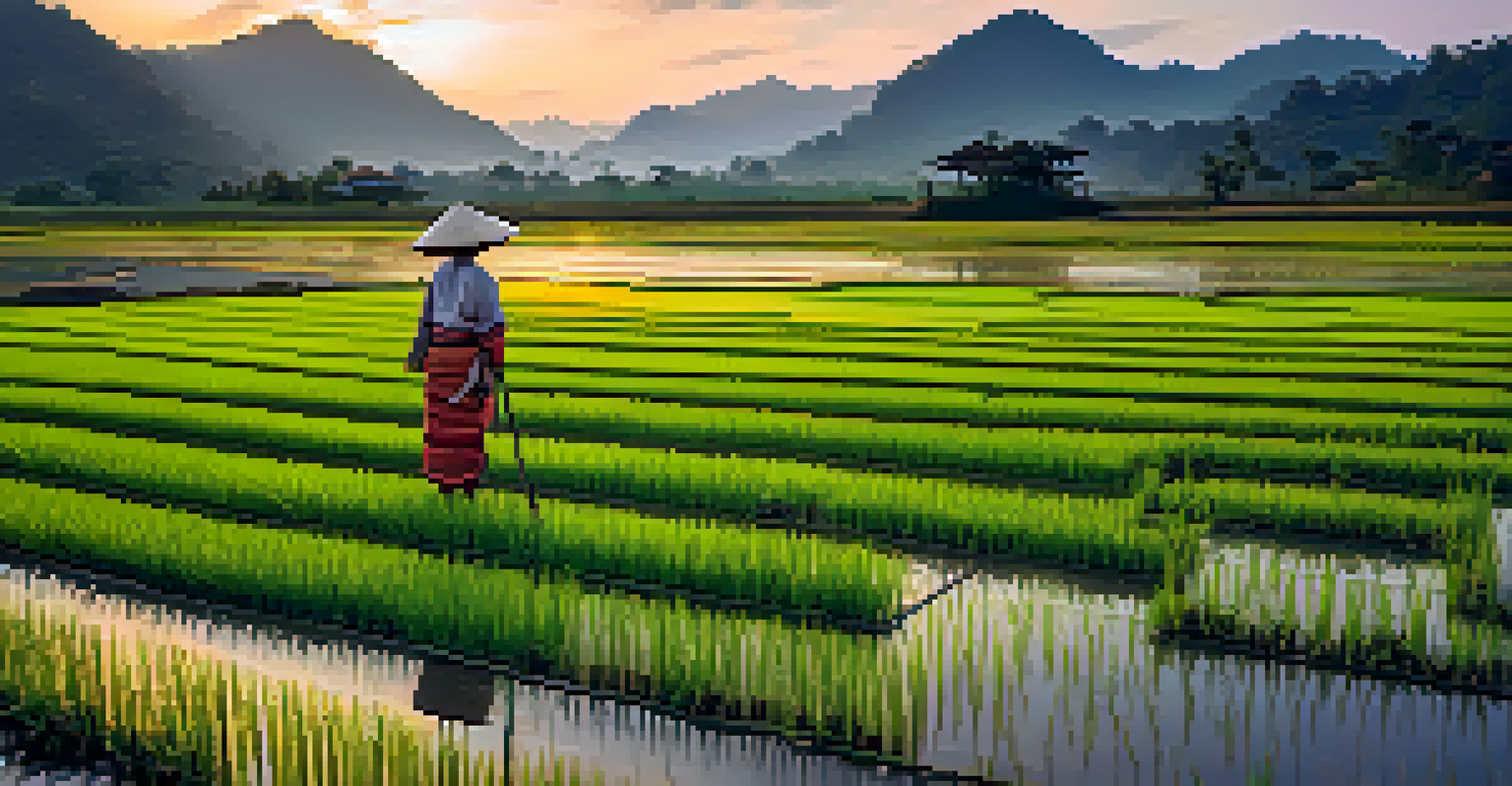Cultural Immersion: Learn Rice Farming in Northern Thailand

Understanding the Importance of Rice in Thai Culture
Rice is more than just a staple food in Thailand; it's a vital part of the culture and identity. For many Thai people, rice symbolizes prosperity and sustenance, often referred to as 'the heart of Thai life.' Understanding this perspective helps you appreciate the deep-rooted traditions surrounding rice cultivation.
Rice is the most important thing in Thailand. It's not just a food; it's a part of our culture and identity.
In Northern Thailand, rice farming is often seen as a communal effort, where families and neighbors come together to plant and harvest. This collaborative spirit not only strengthens community bonds but also preserves age-old practices passed down through generations. It's a beautiful example of culture in action.
By immersing yourself in rice farming, you can witness firsthand the rituals and customs that accompany this essential process. From ceremonies to celebrate the planting season to gratitude expressed during harvest, every step is infused with cultural significance, making the experience enriching and memorable.
Choosing the Right Location for Rice Farming Experience
When it comes to experiencing rice farming, Northern Thailand offers stunning landscapes and rich agricultural traditions. Regions like Chiang Mai and Pai are particularly famous for their lush rice terraces and vibrant farming communities. Choosing the right location can greatly enhance your immersion experience.

Many farms in these areas offer workshops and tours where visitors can participate in planting, harvesting, and even cooking with the rice they've helped cultivate. This hands-on approach not only engages you with the process but also allows you to connect with local farmers who share their stories and expertise.
Rice: Heart of Thai Culture
In Thailand, rice symbolizes prosperity and sustenance, playing a crucial role in both cultural identity and community traditions.
Before you go, consider what type of experience you're looking for. Whether you want a short tour or an extended stay on a working farm, the diverse options available can cater to your interests and schedule, ensuring a fulfilling cultural immersion.
The Rice Farming Process: From Seed to Harvest
Rice farming is an intricate process that begins with selecting the right seeds and preparing the land. Farmers often use traditional methods, which include plowing and leveling the fields to ensure optimal conditions for planting. Understanding this process allows you to appreciate the hard work that goes into each grain of rice.
The heart of a farmer beats in the rhythm of the seasons, and the harvest is the song of their labor.
Once the fields are ready, it's time for planting, which usually occurs during the rainy season. This is a labor-intensive task that can involve transplanting seedlings from nurseries into flooded fields. Participating in this process can be a rewarding way to connect with the land and learn about the care that rice plants require.
As the rice grows, farmers monitor its progress and manage pests and weeds, using techniques that have been refined over generations. Finally, the harvest marks a celebration of hard work and community spirit, as families gather to reap the rewards of their labor. Every phase of this journey offers a unique insight into the agricultural traditions of Northern Thailand.
Connecting with Local Farmers: Stories and Wisdom
One of the most enriching aspects of cultural immersion in rice farming is the opportunity to connect with local farmers. These individuals possess a wealth of knowledge about rice cultivation, passed down through their families. By engaging in conversations, you can learn about their experiences, challenges, and the significance of rice in their lives.
Many farmers are eager to share their stories and insights, offering a personal touch to your learning experience. Whether it’s discussing traditional farming techniques or the impact of modern practices, these interactions provide a deeper understanding of the culture surrounding rice farming in Northern Thailand.
Engaging with Local Farmers
Connecting with local farmers provides valuable insights into traditional rice cultivation practices and fosters community relationships.
Moreover, these exchanges can lead to lasting friendships and connections that extend beyond your trip. By fostering relationships with local farmers, you not only enrich your own experience but also contribute to the preservation of their traditions and way of life.
Culinary Delights: Cooking with Fresh Rice
After a day of working in the rice fields, there's nothing quite like enjoying a meal made with freshly harvested rice. Thai cuisine is renowned for its vibrant flavors and fresh ingredients, and rice acts as the perfect base for many dishes. Learning to cook traditional meals adds another layer to your cultural immersion experience.
Many farms offer cooking classes where you can learn to prepare local dishes using the rice you've helped cultivate. Imagine making a fragrant bowl of jasmine rice or crafting a spicy curry, all while surrounded by the breathtaking landscapes of Northern Thailand. These cooking experiences provide not only delicious meals but also insights into the culinary traditions of the region.
Furthermore, sharing a meal with local families allows you to experience their hospitality and cultural practices firsthand. Meals in Thailand are often communal, and partaking in this custom fosters a sense of belonging and connection, making your journey even more memorable.
Respecting Sustainable Practices in Rice Farming
As you delve into the world of rice farming, it's essential to understand the importance of sustainable practices. Many farmers in Northern Thailand are committed to preserving their land and resources for future generations. Learning about these methods can inspire you to consider your own impact on the environment.
Sustainable rice farming often involves crop rotation, organic fertilizers, and water management techniques that minimize environmental impact. By participating in these practices, you not only contribute to sustainable agriculture but also gain a deeper appreciation for the delicate balance between farming and nature.
Sustainable Rice Farming Practices
Understanding and participating in sustainable rice farming methods highlights the importance of environmental stewardship in Thai agriculture.
Moreover, supporting local farmers who prioritize sustainability helps ensure that these traditions continue. By choosing to engage with eco-friendly practices, you become part of a movement that values both cultural heritage and environmental stewardship.
Planning Your Trip: Tips for Cultural Immersion
Planning a trip to Northern Thailand for a rice farming experience can be exciting, but a bit of preparation goes a long way. Start by researching local farms that offer immersive programs, and consider the time of year for your visit, as rice planting and harvesting seasons vary. This will help you get the most authentic experience.
Be open to adapting your itinerary based on local customs and weather conditions. Engaging with farmers and community members can lead to unique opportunities that you might not find in a guidebook. Flexibility can enhance your experience and create unforgettable memories.

Finally, immerse yourself in the local culture by learning a few basic Thai phrases and being respectful of local traditions. This will not only enrich your interactions but also show your appreciation for the culture you're experiencing, making your trip even more meaningful.